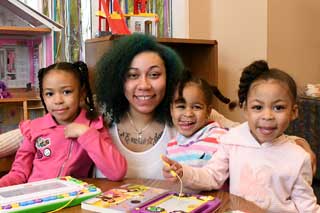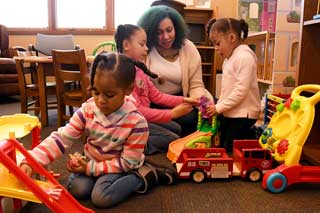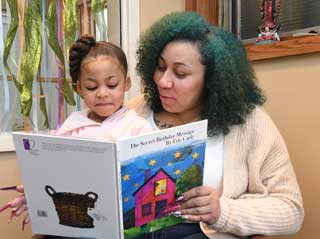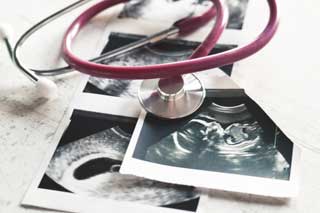How Catholics Walk with Moms in Need

When Tee’aira Adams became pregnant with her first child, she “was so lost.”
“I didn’t know what I was going to do…how do you take care of a baby?” she said, recounting her experience at the time.
Tee’aira’s sister recommended Caring Network, a ministry for moms in need supported by Catholic Charities of the Diocese of Kalamazoo. It’s been six years since that initial contact, and Tee’aira is now mother to three children, in cosmetology school and running her own small business.
Accompanying Tee’aira along her journey have been the staff and volunteers of Caring Network, who surround mothers with the love and support they need but might not have.
“They have helped me cover every aspect of being a mother, being an adult. They have been there for me when I didn’t know what to do,” Tee’aira said, whose voice became emotional as she shared her experience.
“Walking with Moms in Need is about supporting both mother and child.”
Tee’aira’s story is just one of thousands of how Catholic agencies such as Caring Network have been there for moms who need support. The Network has assisted more than 7,500 mothers who chose life for their children.
“Our mission is to provide services just like Jesus Christ,” said Marti Jensen, family support specialist case manager for the parents as teachers program and supervisor at Caring Network, who has worked with Tee’aira over the years. “We’re not here to judge them, we’re here to open up our arms and help them.”
Caring Network is one example demonstrating how the Catholic Church accompanies mothers in need through pregnancy, birth and parenthood. This edition of focus aims to show how the various ministries of the Catholic Church support mothers and their children.
The debate over abortion regulation is again front-and-center in the minds of many across the country, as the U.S. Supreme Court considers a case that could overturn Roe v. Wade, the 1973 court ruling allowing for abortion in every state.
In Michigan, abortion advocates have unveiled a proposal to enshrine abortion in the state constitution, a measure Michigan Catholic Conference will fight.
One misperception pushed by abortion advocates is that the Church and those who are pro-life care more about unborn babies and not the mothers who carry them, or about the life of the child following birth.
The irony is that the men and women who work in pro-life ministries—which help support both the mother and child—say they hear that misperception all the time.
“That’s hogwash,” said Tim Donovan, who heads up the Livingston County Ultrasound Initiative, a nonprofit helping raise money for pregnancy centers to pay for ultrasound machines.
In fact, the Church has a heart for both the mother and the baby, in accordance with the bedrock principle of its social teaching, which holds that all human life is sacred and must be protected from conception to natural death.
“It’s the sanctity of life we’re protecting,” said Lori Becker, coordinator of diocesan outreach for the Diocese of Saginaw. “The Church is practicing what they preach. They are following up on that and they are doing what they can do to protect that life…and not just the baby, but the whole life.
“It’s a core belief in the sanctity of life, and we’re living it.”
While the tragedy of abortion rightly receives ample attention because it affects the most vulnerable among us—the unborn—the Church has no shortage of concern for women and the challenges they face in their vocation to motherhood.
That concern for mothers and babies has transformed into action. From the U.S. bishops’ conference down to the parish level, to Catholic Charities, the Knights of Columbus, and more, the Church is continually reaching out to mothers in difficult situations. With a large footprint across the state, lay and ordained Catholics are helping women and their children flourish, whether before, during or after they give birth.
The Church’s ministry also stretches to women who undergo abortion, offering opportunities to heal and cope with the grief they may experience.

“They have been there for me when I didn’t know what to do.”
The Church’s concern for mothers is reflected in its leadership: In 2020, the U.S. Conference of Catholic Bishops (USCCB) launched the Walking with Moms in Need initiative. The idea is to ensure every Catholic knows where to refer a mom in need.
“Our goal is not only to identify gaps or areas with insufficient resources, but then to take concrete steps to expand the help available to mothers, not only during the pregnancy but for months and even years after the child’s birth,” said Archbishop Joseph Naumann of Kansas City, who spearheaded the launch of the initiative as past chair of the USCCB’s Committee on Pro-Life Activities.
Since its launch, the call to walk with moms in need has reached the diocesan and parish levels in Michigan.
For St. Catherine of Siena Parish in Portage, for instance, that’s meant compiling a list of the local pregnancy centers. It also spurred the parish to formally support pregnancy centers with fundraisers.
A similar process of creating an inventory of resources available to moms is occurring in the Archdiocese in Detroit, which will improve how efficiently Catholics will be able to connect moms with help.
“Walking with Moms in Need is about supporting both mother and child. In fact, it’s supporting the mother first, and then the child indirectly through supporting the mother,” said Andrea Spankie, coordinator for Walking with Moms in Need for Catholic Charities of Southeast Michigan, which operates in the Archdiocese.
A mother should know her physical, emotional and spiritual needs will be met during her pregnancy but also after giving birth, as she navigates the postpartum period while learning to be a parent and caring for the demands of a newborn.
“Moms in need are all around us, in our communities and even right in our pews,” Spankie said. “Facing difficulties such as lack of financial resources, lack of family support, lack of community with women in similar situations, these moms need to be shown care and encouragement.”
At Caring Network and other Catholic-supported pregnancy centers, that care and encouragement is shown in many ways.
Physical needs are addressed: food, housing, clothes, car seats and toys, to name a few. At the Caring Network building in Kalamazoo, there’s a shower and bathroom that anyone can use, as well as a kitchen and laundry room. There’s also a pantry filled with children’s clothes, maternity clothes, hygienic products, cleaning supplies and more.
From watching her children while she completed job training, to helping her put food on the table and clothes on her children, Tee’aira said Catholic Charities and Caring Network have “done everything.”
Even providing Tee’aira with maternity clothes “was more than a blessing, that was truly a miracle,” she said. Tee’aira explained maternity clothes are important for staying comfortable as her body changed throughout pregnancy, but because they’re more expensive, they were more of a luxury that she wouldn’t have been able to afford otherwise.
It’s a similar situation for Catholic Charities operating across Michigan. Most offer services to mothers, whether it’s pregnancy counseling, baby supply pantries, or helping place children through adoption.
“There’s a gap that I think most Catholic Charities saw that that need wasn’t being met,” said Toni Newell, chief operations officer of Caring Network, when asked why services for moms is a commonality among Catholic Charities. “They saw a need in society that wasn’t being met, and it felt like a logical place for that to be housed was at Catholic Charities.”
That’s also the case up north, where Catholic Social Services of the Upper Peninsula is set to open a women’s recovery house in Escanaba in spring 2022, with the aim of providing support to pregnant women, mothers and their children, and other at-risk families that are currently lacking in the Upper Peninsula.
In the metro Detroit area, Project Hope, an initiative of Catholic Charities of Southeast Michigan and the Archdiocese of Detroit, provides pregnancy testing, counseling, parenting education and prenatal care referrals. It also operates baby closets with free diapers, wipes, formula, baby food, infant clothing, blankets and other necessities.
Project Hope isn’t alone in providing these needs. Spankie said three parishes directly supported Project Hope through their Advent giving trees this year, resulting in hundreds of baby items being donated.
Catholic parishes across the state have been known to host baby showers for mothers in need, or running baby pantries themselves, such as St. Pio of Pietrelcina Parish in Utica.
Tina Bullis, the Christian service coordinator for the parish, said St. Pio’s baby pantry serves all of Macomb County, which is the third-most populous county in Michigan.
“We’re busy every single day,” she said.
Bullis said she’s been a part of the parish for 30 years, and the baby pantry has always had a presence at the parish.
“We’re committed to enhancing their life,” she said.
But it’s not just material needs. Caring Network and other Catholic Charities agencies go beyond immediate physical needs by offering services like parenting classes.
When Tee’aira first came to Caring Network, she wasn’t sure how to be a parent. She still reminds Jensen at Caring Network of this today.
“I remember asking her, what am I supposed to do with this baby?” Tee’aira said.
Jensen said a client of Caring Network suggested they offer parenting classes. So now they do, both in terms of helping women’s interactions with their children and in self-care, as well as equipping parents to prepare their kids for lifelong learning.
“When you don’t have knowledge about how to care for someone who is dependent of you, you don’t know what you’re up against, and the fear of the unknown can cause you to react in a negative way,” Tee’aira said.
With Caring Network at her side, “I was able to learn, OK, what does it take to be a good mother?”
There’s also ongoing support for mothers as they journey through parenthood with their children. Many pregnancy centers offer help until the children reach a certain age, but that does not mean the connections are lost.
Tee’aira is still in regular contact with the folks at the Network.
“Even when our clients, after we close them out, we’re still there. They can still call up,” Jensen said.
“Moms in need are all around us, in our communities and even right in our pews.”
For some mothers, whether they consider an abortion could come down to whether they feel they have support for the child they’re bringing into the world.
“The first interest, I think, in this situation with a woman is to help her to see the value of the child and the value of her own soul,” said Sharon Gill, who heads up the pro-life group at St. Lawrence Catholic Church in Utica. That process includes providing “financial, medical, emotional, spiritual assistance,” she said.
If the support isn’t there, a woman may feel abortion is her only option.
That rang true for Tee’aira when she found out she was pregnant again following the birth of her first child, Jasmine, who is now 6 years old. Tee’aira wasn’t convinced she had enough to support another child, which is why abortion was an option she considered.
“Going into being a mother, you don’t think your child will have everything that they need,” she said. “And that’s why abortion is such a big deal for most families, because you don’t want to bring another life into the earth if you can’t provide for that life…which is one of the options that I considered taking.”
Tee’aira remained connected to Caring Network since her first pregnancy, who told her she had other options if she carried the pregnancy to term, such as adoption.
“With them saying no matter what I choose, I would still have their support, that really helped and it gave me comfort and I decided to keep my children,” she said.
Those children turned out to be a set of twins: Emorie and Sabrina, now 3 years old.
Jensen said the network’s goal is to help moms to choose life, and to show them they have the support to choose life.
“Just knowing somebody’s there, a lot of times, just knowing that there’s somebody in their corner and they’re going to help them through this,” Jensen said, when asked what changes the mind of mothers considering an abortion.
Supporting mothers in need could become even more important as the country watches for whether the U.S. Supreme Court overturns the nearly 50-year-old Roe v. Wade decision that legalized abortion.
If the court were to overturn Roe later this year, it would send abortion regulation to the states, and in Michigan, there’s an existing abortion ban that would likely go back in effect.
And if that happens, pregnancy centers might expect to find more women coming to their doors who otherwise would not have been there.
“There’s going to be a lot of women in need,” Gill said. “And we really have to fill those gaps for these women.”
But regardless of the legal landscape now or in the future, the Church continues to do what she does for mothers in need and will continue to do so.
“We always want to adapt,” said Adam Perry, director of the Center for the Works of Mercy with Catholic Charities of Southeast Michigan, adding, “If need increases, we will increase with the need.”
As the architect behind Walking with Moms in Need, Archbishop Naumann, said, “Lives that we may not currently be able to protect by the law, we can rescue through love.” ■
Want to Walk with Moms in Need?

As part of their Evangelical Charity Finder, the Archdiocese of Detroit has a directory of pro-life ministries available online. Visit evangelicalcharity.org, then click or tap Pro-Life Ministries.
To help mothers and children in need with your time, talent and treasure, reach out to your parish, find a local pregnancy center, or visit walkingwithmoms.com.
Project Rachel Provides Hope to Grieving Parents After Abortion

The Church isn’t only concerned about the mother who chooses to go through with her pregnancy.
For mothers who have suffered abortion, there is Project Rachel and Rachel’s Vineyard, a pair of ministries catered to women who have undergone abortions and are seeking healing from the experience.
The programs were developed by Catholics and it involves a retreat experience where women can ask for and receive forgiveness, as well as adopt coping skills to handle the grief they may face, said Lori Becker, director for Project Rachel for the Diocese of Saginaw.
One of the priests who assists on the retreats told Becker that “it never failed, every retreat he had been a part of, he could see the difference from the way the person walked in and…on the day that they left, the transformation in them, and the…peace that they were carrying now.
“You could visibly see the difference…it’s an amazing impact,” she said.
For the Church to develop and support a post-abortion ministry, Becker said it shows that women who have gone through abortion are “welcome, we are not judging them, we want to be a part of their healing, and that God has already forgiven them.”
And of course, everything is very confidential, Becker said. ■
For more information about Project Rachel and to find a local Project Rachel in your area, visit hopeafterabortion.com.
Changing hearts and minds: Catholics Fundraise for Ultrasound Machines

Ultrasounds change hearts and minds when it comes to decisions about abortion—“it’s a proven fact,” said Tim Donovan, who runs the Livingston County Ultrasound Initiative, a nonprofit raising money for ultrasound machines for pregnancy centers.
Helping pregnancy centers access the technology so women can see the life inside of them is another ministry among many in the Church to serve mothers.
Leading the charge are the Knights of Columbus, a worldwide fraternal order of Catholic men, who recently marked the 1,500th ultrasound machine they’ve donated to pregnancy centers.
At a dedication ceremony for the machine, Supreme Knight Patrick Kelly said the Knights “continue the Order’s mission by working tirelessly, through prayer and action, to support mothers and their children, both unborn and born.”
Local K of C councils can raise up to 50% of the cost of an ultrasound machine—they typically run $75,000 but can be discounted down to $45,000, Donovan said—and the Knights’ Supreme Council will agree to cover the other half.
For Donovan’s nonprofit, they will raise money toward the portion that a local Knights council must raise for a particular ultrasound machine.
Donovan—a Knight himself and parishioner of St. Joseph Catholic Church in Howell—said his nonprofit has helped more than 20 pregnancy centers with acquiring ultrasound machines across Michigan.
Ultrasounds have made a difference in helping mothers choose life. Just ask Sharon Gill, who leads the pro-life group at St. Lawrence Catholic Church in Utica, who shared a story about a woman who was scheduled for an abortion at Planned Parenthood but got an ultrasound in the interim.
“We had many, many people praying that she would change her mind. When she saw the ultrasound, she changed her mind,” Gill said.
“She sees the ultrasound, and that was it. This is my child, I’m not going to do this.” ■
